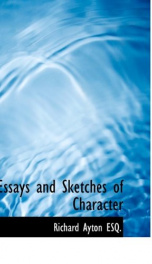essays and sketches of character

Purchase of this book includes free trial access to www.million-books.com where you can read more than a million books for free. This is an OCR edition with typos. Excerpt from book: ON THE MORAL INFLUENCE OF ETIQUETTE AND PARADE. Some philosophers and declaimers, disgusted with the vanities of polite society, have concluded that happiness and true dignity can exist only in the savage state. Herein, I think, they are manifestly wrong. There is an intermediate state, surely, between the opposite extremes of barbarism and extravagant refinement, better suited than either of them to the free and right exercise of man's intellectual endowments and natural affections. Man was right, it appears to me, when he betook himself to soap and water; neither is he without a respectable plea for his use of combs; nor can I, in my heart, think much the worse of him, for declining to eat his meat either raw or alive. In his moral conditions too, as well as in his external circumstances, I can make many allowances for his departure from some of the simplicities of Otahcite. His emancipation from thievish propensities, for instance, may be borne with ; and his neglect of the " good old practice" of knocking young children or old persons on the head, when considered troublesome or unnecessary, is, in my opinion, absolutely commendable. These modest improvements are'within the verge of the intermediate state that I have mentioned; and no man, perhaps, in clothes and his senses, would deliberately condemn them. If there were no such state, however, and the question of preference lay between a condition purely natural or savage, and the highest degree of what we call refinementbetween a wigwam and a palace, the Boshies-men and the beau mondea man might hesitate in his decision, yet not be mad; or might finally turn from kings and their courts, and give his choice to his kindred in the woods, yet not be indifferent to the glories of human intellect, and the charms of human l... --This text refers to an alternate Paperback edition.
Users who have this book
Users who want this book
What readers are saying
What do you think? Write your own comment on this book!
write a commentif you like essays and sketches of character try:
Other books by this author
Do you want to read a book that interests you? It’s EASY!
Create an account and send a request for reading to other users on the Webpage of the book!

